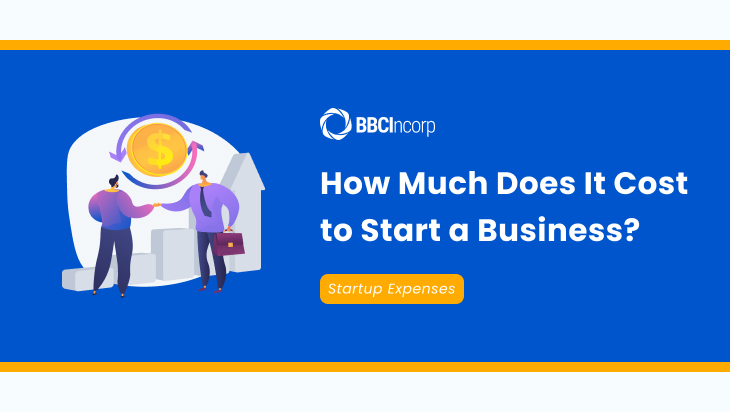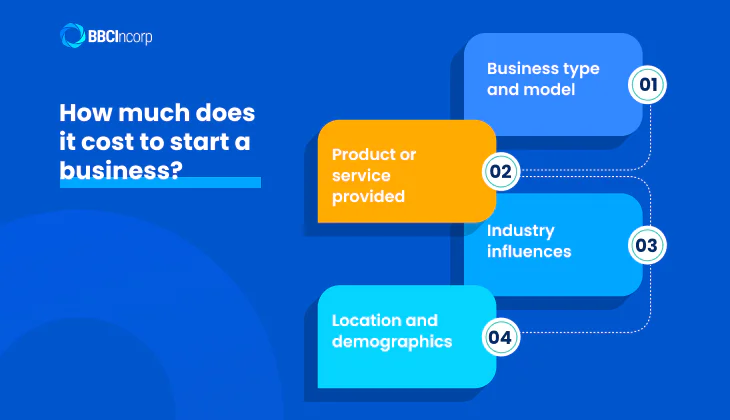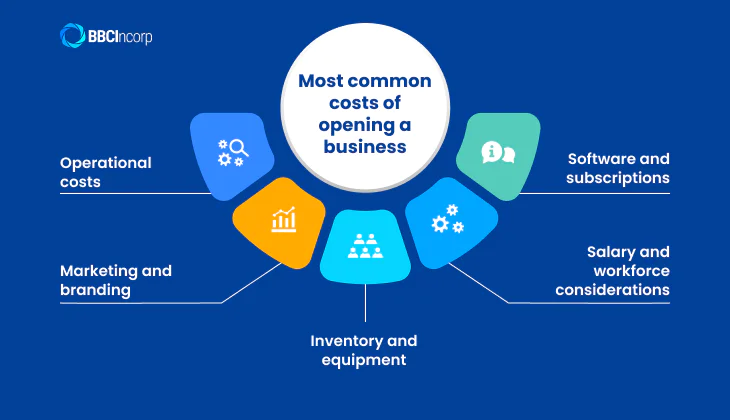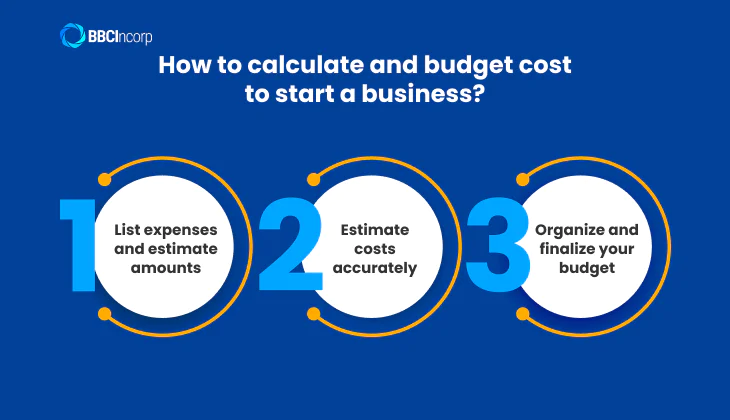
Table of Contents
Starting a business is always an exciting leap, but let’s be practical: there is a lot to consider. One of the most crucial steps is understanding costs and risks to stay ahead of potential challenges.
So, how much does it cost to start a business? The answer depends. You could launch an online venture with just $100, while a full-scale brick-and-mortar business might require $750,000 or more.
The difference between a struggling startup and a thriving one often comes down to financial planning. Unexpected costs can derail even the best ideas, but a solid strategy keeps you in control. Today, let us break down the numbers, cut through the guesswork, and provide assistance in building a business set up for success from day one.
Understanding types of startup costs for a business
Starting a business is a financial puzzle. Get the numbers right, and you set yourself up for success. Get them wrong, and even the best business plan can unravel. From the one-time setup cost of starting a business to ongoing expenses, knowing what to expect will help you stay in control.
Therefore, below are a few significant fees you should differentiate:
One-time vs. recurring costs
Some expenses happen once, while others keep coming back. One-time costs include incorporation fees, branding, website development, and initial inventory. These are the upfront investments that get your business off the ground.
Recurring costs, on the other hand, are ongoing expenses like rent, salaries, restocking inventory, and marketing. Managing these properly ensures a steady cash flow and prevents financial strain.
Fixed vs. variable costs
Some expenses stay the same every month, while others fluctuate. Fixed costs, such as rent, insurance ($684 per year on average), and software subscriptions, remain consistent regardless of sales.
Variable costs, including raw materials, shipping, and production, change depending on business activity. Even credit card processing fees range from 1.5% to 3% per transaction based on sales volume. Startups with high fixed costs need reliable revenue streams, while those with more variable costs can scale spending as needed.
Essential vs. optional costs
Not all expenses are equally important. Inevitable costs, like business licenses, permits, and working capital, are critical for operations. Without these, the business can’t function.
On the contrary, optional costs (e.g., upscale office décor or premium marketing campaigns) enhance operations but aren’t necessary at the start. Prioritizing essentials will conserve resources and foster sustainability before investing in extras.
Hidden costs
Let’s not forget the hidden costs that can sneak up on you. Business insurance, website maintenance, legal fees, and compliance costs can take a bite out of your budget when you least expect it.
Further, a professional website alone can cost $1,000 to $5,000, and that’s before you factor in updates and security. These “small” expenses add up, so the more you anticipate them now, the fewer surprises you’ll face later.
How much does it cost to start a business?

There’s no universal answer to a startup’s costs. It all depends on what you’re building, where you’re located, and how you plan to operate. Some businesses take off with just a laptop and a few hundred dollars, while others need a six-figure investment before opening their doors.
Therefore, preparing for these costs in advance keeps your company strong over the long term, here are some insights you may need.
Business type and model
These days, online businesses require significantly lower investment. A freelance gig might need as little as $100, while launching an e-commerce store could cost a few thousand dollars, covering website setup, marketing, and inventory.
In contrast, brick-and-mortar businesses come with higher expenses. A small café or boutique typically requires at least $50,000 for rent, renovations, and equipment, while a retail store may demand about $40,000 before making the first sale. These costs include rent, permits, insurance, and staffing.
Product or service provided
Service-based businesses tend to have lower startup costs than product-based ones. A consultant, designer, or cleaning service can launch with a few thousand dollars for branding and marketing. However, businesses selling physical products, especially those that require inventory or manufacturing, need more.
Dropshipping businesses, for example, cost around $10,000 to launch. If you manufacture custom products, initial expenses might be heavier due to production, logistics, and storage.
Industry influences
Some industries require much larger investments than others. Professional services like accounting or graphic design have minimal startup costs, while businesses in construction, restaurants, or utilities demand substantial capital.
Opening a restaurant costs an average of $375,000 (Restaurant Owner’s survey), factoring in kitchen equipment, furniture, and operational expenses. On the contrary, the average operating costs for a small business are around $37,000 to get started, covering tools, permits, and labor.
Location and demographics
In most cases, rent is usually one of the largest expenses for a physical store. Urban areas face a higher cost to start a company, while rural regions tend to be more affordable. Despite that, rural areas do present trade-offs such as a smaller customer base and limited workforce availability.
In the U.S., the average retail rent is $23.98 per square foot, but in the Midwest, it can be as low as $18.26 per square foot. High-cost cities like New York, San Francisco, and Los Angeles often see commercial rents exceeding $50 per square foot.
Most common costs of opening a business

Every enterprise needs an initial investment, but how much money do you need to start a business? While costs may change by industry, several core expenses apply to most ventures. Let’s take a look at some of this spending.
Operational costs
Administrative and facility costs are key expenses.
Licensing, permits, and legal fees differ by industry and location, ranging from a few hundred to several thousand dollars. Leasing a storefront costs $1,500 to $10,000 per month, while home-based businesses are far more affordable. To cut overhead, many opt for coworking spaces or shared offices.
Utilities, internet, and technology add to recurring costs, with commercial electricity averaging $660 per month in the U.S. Thus, investing in energy-efficient equipment and negotiating service contracts can lower expenses in the long run.
Marketing and branding
Getting noticed in a crowded market is just as important as having a great product. A strong brand and smart marketing strategy can turn a small startup into a recognized name.
For instance, digital marketing costs range from only $1 to $2 per click for Google Ads to $2,000 per month for professional content marketing. Branding features, like logo design and website development, tend to range from $500 to $5,000, per customization.
If your startup is on a budget, social media marketing and DIY tools like Canva offer cost-effective alternatives. The key is to start small, test what works, and scale as revenue grows to bring back a higher return on investment.
Inventory and equipment
Inventory is one of the biggest upfront investments for product-based businesses. E-commerce startups spend $2,000 to $10,000 on initial stock, while construction firms may invest $50,000 or more in specialized equipment. Instead of tying up capital, many businesses opt for leasing or supplier financing to manage costs.
What about service-based businesses? Notably, they may not need inventory but still require industry-specific tools and software. As a solution, smart purchasing, starting with a lean inventory or sourcing second-hand equipment, reduces startup costs for a business and keeps more cash available for growth.
Salary and workforce considerations
Building the right team is a major investment, and staffing costs vary depending on the business model and growth stage.
A full-time employee typically earns $50,000 per year, but the actual expense is higher when factoring in benefits and taxes. Many startups turn to freelancers or contractors, paying per project or hourly instead of committing to full-time salaries to stay flexible and control costs.
In addition, automation and AI-powered tools help businesses streamline operations, reducing reliance on manual labor while boosting efficiency. Hence, finding the right balance between human talent and technology is also important.
Software and subscriptions
Technology enhances efficiency and scalability, but startups need to manage software costs. Project management tools, CRM systems, and accounting software generally range from $10 to $300 per month, per feature and team size. To minimize expenses, many businesses start with free trials, explore open-source alternatives, or opt for bundled packages.
Carefully evaluate business needs before committing to paid plans to prevent overspending. As the company grows, upgrading the facilities ensures that costs remain manageable while supporting operations effectively.
How to calculate and budget cost to start a business?
A clear budget eliminates chances of financial missteps and ensures a smooth launch. To navigate the process more easily, you can follow these steps to estimate and manage startup expenses effectively.

Step 1: List expenses and estimate amounts
- Identify essential costs such as business registration, office space, marketing, and inventory.
- Separate expenses into one-time (e.g., incorporation fees, equipment purchases) and recurring (e.g., rent, salaries, utilities).
- Prioritize must-have expenses over optional ones to keep costs manageable.
Step 2: Estimate costs accurately
- Research industry standards and collect quotes for major expenses.
- Compare suppliers, negotiate service contracts, and explore cost-saving alternatives like leasing or open-source software.
- Consider location-based expenses, urban areas typically have higher rent and labor costs than rural locations.
Step 3: Organize and finalize your budget
- Categorize costs into fixed (e.g., rent, insurance) and variable (e.g., inventory, shipping).
- Use budgeting tools or financial planning software to track and adjust spending.
- Set aside at least 10-20% of your total budget as a contingency fund for unexpected expenses.
- Reevaluate costs regularly to align with business growth and revenue projections.
In short, budgeting properly helps startups manage finances effectively, secure funding if necessary, and focus on sustainable growth.
Tips for keeping startup costs manageable
Early investment decisions can make or break your startup’s ability to stay afloat, so here are several methods to plan for expenses when starting a business:
Key to controlling costs effectively
- Operate lean: Keep fixed costs low and efficient. You can consider working remotely if possible, and outsource non-core tasks instead of hiring full-time staff too soon.
- Start small: Focus on a limited product or service offering before expanding. This phase is vital for refining operations, testing market demand, and reducing financial risk.
- Use cost-effective tools: Open-source software and cloud-based platforms provide affordable alternatives to expensive solutions. In fact, many offer free plans that cover crucial business functions.
- Leverage partnerships: Partner with complementary businesses across related industries for cross-promotion. Sharing marketing efforts and resources allows you to reach new audiences at a lower cost as well.
Common budgeting mistakes
- Ignoring hidden costs: Expenses such as business licenses, compliance fees, and tax liabilities can add up quickly. Research all potential costs in advance to prevent surprises.
- Underestimating marketing expenses: A strong strategy requires more than ad spend. Content creation, branding, and customer engagement also require time and resources, so budget accordingly.
- Overlooking technology costs: Website development, cybersecurity, and software often cost more than expected as they constantly evolve. Plan for these expenses from the start to avoid disruptions.
How to cover your expenses when starting a business?
Next are the financial tips on securing the right funding for managing your startup expenses.
Traditional financing options
Securing the right funding is necessary for managing startup expenses. One of the simplest ways to fund your startup is by using personal savings or reinvesting early profits. This approach keeps you debt-free and in full control, but it also puts your personal finances at risk.
If you need external funding, business loans (e.g., SBA loans) can provide structured financing with competitive interest rates. It should be noted, however, that they often require strong credit and collateral, which may not be ideal for every entrepreneur. Alternatively, if you’re open to exchanging equity for capital, angel investors and venture capital firms can offer both funding and strategic guidance to scale your business faster.
Alternative funding strategies
Beyond traditional financing, alternative funding strategies can also play a crucial role. Crowdfunding platforms like Kickstarter and Indiegogo allow you to raise capital from a broad audience, turning potential customers into early backers.
However, success requires a compelling campaign that captures interest. Using business credit cards is another option to manage cash flow, but their high interest rates make them best suited for short-term expenses.
Optimize your startup budget with a company formation package from BBCIncorp. Our all-in-one solution covers registration, compliance, and essential setup, with cost-effective and customizable options to meet your business needs.
Start your business with BBCIncorp today
Launching a business is exciting, but legal and financial preparations can quickly become overwhelming and costly. This is where BBCIncorp simplifies the process with an all-in-one, cost-effective solution; starting from just US$899 (US$999 with an Airwallex business account included).
Here’s how we optimize your investment while minimizing expenses:
- Company formation: Quick, hassle-free incorporation with expert support across global jurisdictions: limited company in Hong Kong, private limited company in Singapore, offshore entities in Delaware, Cayman Islands, Bahamas, etc.
- Bank account opening: Full support to secure your business account with trusted international banks, both traditional and online, as well as other financial institutions (e.g. Airwallex, Payoneer, etc.)
- Annual compliance: Our team keeps you updated and compliant with legal regulations like renewance, tax filings, and reporting requirements. Real-time monitoring is available for all processes on our portal platform.
Get started today by visiting our offshore company incorporation services page for more details.
Conclusion
How much does it cost to start a business? The answer varies, but one thing is certain: smart planning makes all the difference. Understanding expenses, achieving the right funding, as well as keeping operations lean can turn financial challenges into opportunities for growth.
The first step is yours to take. Start by calculating your costs, exploring funding options, and finding ways to streamline expenses.
With the right approach and expert support from BBCIncorp, launching your business can be a smooth and rewarding journey. Send us an email at service@bbcincorp.com for timely support from our expert team today.
Disclaimer: While BBCIncorp strives to make the information on this website as timely and accurate as possible, the information itself is for reference purposes only. You should not substitute the information provided in this article for competent legal advice. Feel free to contact BBCIncorp’s customer services for advice on your specific cases.
Industry News & Insights
Get helpful tips and info from our newsletter!
Stay in the know and be empowered with our strategic how-tos, resources, and guidelines.





